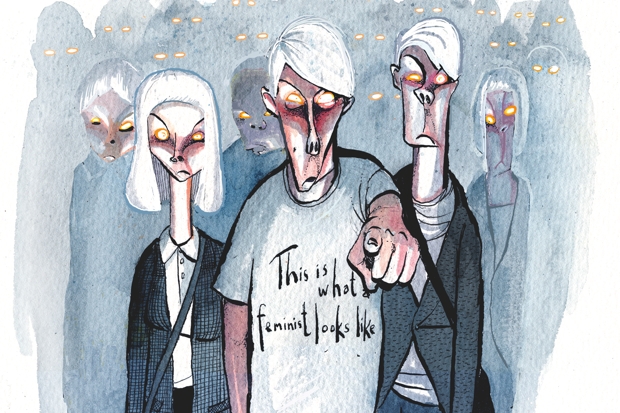Many mad things are happening on campuses. Fancy-dress parties are banned lest the costumes offend minority groups. Saucy pop songs are forbidden lest they turn male students into marauding sex machines. Controversial speakers are No Platformed. But perhaps the worst thing is the rekindling of the racial imagination, the return of judging people by race.
Yesterday was Martin Luther King Day in the US, a day when Americans, and many non-Americans too, celebrate the man who most famously said people should ‘not be judged by the colour of their skin, but by the content of their character’. Also yesterday, it was reported that the student union at the School of Oriental and African Studies in London thinks white professors aren’t capable of teaching black students. A report produced by the SU said ‘non-white students’ find it hard to develop ‘cultural familiarity’ with white professors, because their ‘experiences are so different’. Apparently it is ‘unrealistic to expect white tutors to be able to empathise with [black students]’. Shorter version: whites can’t understand blacks, and vice versa. Sorry, MLK — colour trumps character. What’s the solution to this apparently unbridgeable racial divide? SOAS needs to institute ‘mandatory unconscious bias workshops’ for all staff on recruitment panels, to wash out their unwittingly racist brains and make them hire more black staff to teach black students. So not satisfied with resuscitating the foul old idea that whites and blacks can’t understand each other, the SU also wants to set up racial re-education camps, to make staff more racially aware. ‘Racial awareness’ — a fancy term for racial thinking. The SOAS SU’s dispiriting racial thinking, its questioning of the possibility of cross-racial empathy, is in keeping with a poisonous new identity politics grabbing hold of campus radicals and the left more broadly. Earlier this month, the SOAS SU decried ‘white philosophy’. It said it’s wrong to teach black students the likes of Locke and Kant all the time, and instead ‘the majority of philosophers on our courses’ should be African or Asian. Apparently students with black skin relate better to philosophers with black skin — ‘cultural familiarity’. At Oxford and other campuses there are campaigns to ‘decolonise the curriculum’ — that is, rip out some of the ‘white thinkers’ and replace them with black thinkers black students can connect with.It’s even worse in the US. Some campuses are flirting with the idea of setting up ‘safe spaces’ for black students — the creeping, and creepy, return of segregation. On some campuses you can actually be told off for refusing to think racially. Some universities count as ‘racial micro-aggressions’ comments like ‘There is only one race: the human race’ and ‘I don’t believe in race’. In the words of a University of California guide to micro-aggressions, these comments ‘[deny] the individual as a racial/cultural being’. MLK wouldn’t last a second on campus these days. He’d be No Platformed for banging on about character and failing to appreciate people as ‘racial/cultural beings’.
The campus left’s tragic turn from challenging racial thinking to embracing it speaks to the baleful influence of identity politics. Once the left spoke of solidarity, of rejecting the petty categories of biology and sex in favour of bringing people together around shared interests; now it obsesses over our cultural and inherited traits and boxes us off accordingly. You’re a white man, a white woman, black, gay, trans, disabled, and none of these blocs can truly understand the other. ‘Stay in your lane’ — that’s the wail of the leftish Twitterati at any white dude who talks about black issues or man who ponders feminism. It’s another way of saying: stick with your race, stick with your kind. The cry of the old racist refashioned as a radical stance. It’s actually incredibly offensive to black students to say they relate better to black thinkers. It implies they’re incapable of doing the thing education demands, of everyone: that we rise above ourselves, escape that which is ‘culturally familiar’, and grapple with new, strange ideas. Kant, a German born in the 1720s, is as alien to a white Brit born in the 1990s as he is to a black Brit — but we trust that both are capable of reading him and thinking about him. To say black students are less able to do this, because they’re black, is really out of order.






Comments